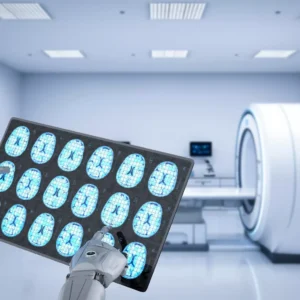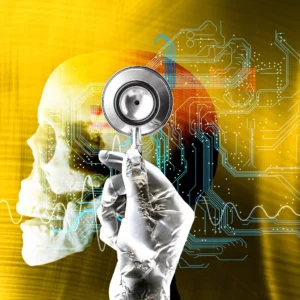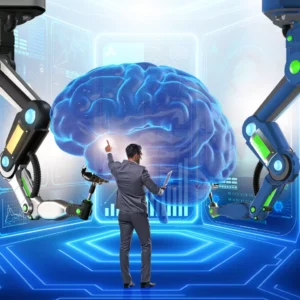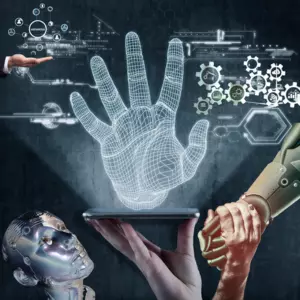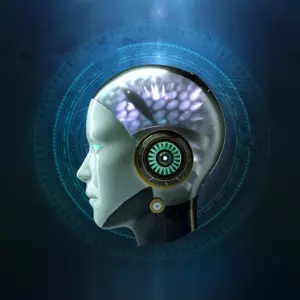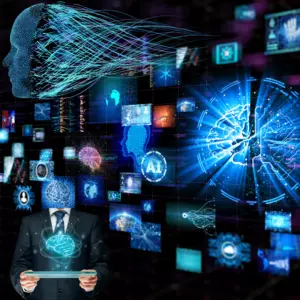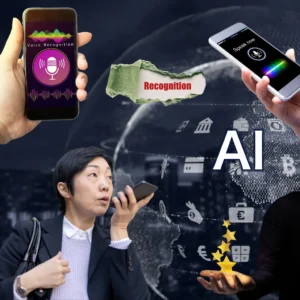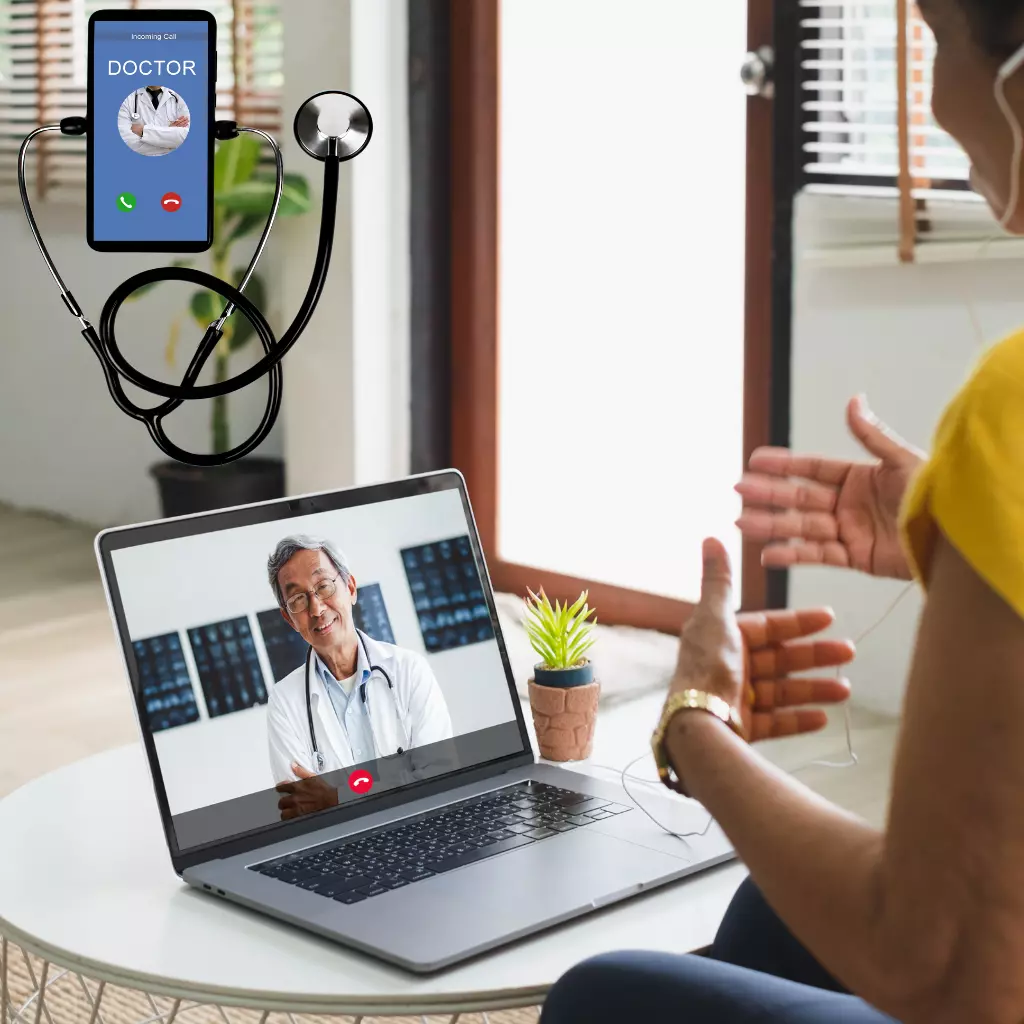
AI in Telehealth
Revolutionizing Remote Care
The dawn of the digital age has given rise to a healthcare revolution – telemedicine. As the global healthcare landscape expands, so does our reliance on virtual solutions.
Integrating Artificial Intelligence (AI) into telehealth has transformed remote care, offering precision, accessibility, and efficiency previously unimagined. From virtual health assistants guiding you through medical queries to AI-enhanced diagnoses and the role of wearables, the digital doctor’s appointment has taken a futuristic turn.
This article delves into the journey of telemedicine’s evolution, AI’s pivotal role in reshaping patient care, and the promise it holds for the future. We’ll touch upon pressing issues like data privacy and address the essential need for training clinicians in this new age of virtual healthcare.
Join us as we unpack the marvels of AI in telemedicine, making remote care more effective and inclusive than ever.
Table of Contents
The rise of Telemedicine
The modern era of healthcare is witnessing a transformation, with AI in Telehealth acting as the linchpin of this evolution. At its core, AI amplifies the efficiency and scope of telehealth services. The days of rudimentary video calls are long gone; today’s AI-driven telehealth platforms offer an array of advanced functionalities.
AI algorithms can sift through vast medical datasets in seconds, aiding clinicians in diagnosing ailments with enhanced accuracy. This proactive approach identifies potential health threats even before they manifest overtly.
One of the most noteworthy innovations is the rise of virtual health assistants. AI enables these digital allies to aid patients around the clock, offering instant medical advice, monitoring vitals, and predicting potential health concerns. Furthermore, AI in mental health telecare provides personalized therapeutic guidance, often bridging the gap for patients who may not have immediate access to therapists.
AI’s role in telehealth is akin to a force multiplier. It not only improves the quality and accessibility of healthcare but also paves the way for more personalized and predictive medicine. Through this synergy, telehealth is set to reshape our understanding of patient care, making it more dynamic and patient-centric.
Role of AI in Telehealth
The modern era of healthcare is witnessing a transformation, with AI in Telehealth acting as the linchpin of this evolution. At its core, AI amplifies the efficiency and scope of telehealth services. The days of rudimentary video calls are long gone; today’s AI-driven Telehealth Platforms offer an array of advanced functionalities. AI algorithms can sift through vast medical datasets in seconds, aiding clinicians in diagnosing ailments with enhanced accuracy. This proactive approach identifies potential health threats even before they manifest overtly.
One of the most noteworthy innovations is the rise of virtual health assistants. AI enables these digital allies to aid patients around the clock, offering instant medical advice, monitoring vitals, and predicting potential health concerns. Furthermore, AI in Mental Health Telecare provides personalized therapeutic guidance, often bridging the gap for patients who may not have immediate access to therapists.
AI’s role in telehealth is akin to a force multiplier. It not only improves the quality and accessibility of healthcare but also paves the way for more personalized and predictive medicine. Through this synergy, telehealth is set to reshape our understanding of patient care, making it more dynamic and patient-centric.
AI-driven Diagnostic Support
Diagnostic accuracy is a cornerstone of adequate healthcare, and this is where AI in Telehealth is making groundbreaking strides. The merger of AI with remote healthcare has ushered in a new era of diagnostic precision.
With the assistance of advanced algorithms, clinicians can now analyze medical data with an intricacy previously unimaginable. These AI-driven Telehealth Platforms can pore over a plethora of patient data, detecting subtle patterns or anomalies that might evade the human eye.
Consider medical imaging, for instance. With AI, radiologists receive support in spotting minuscule irregularities in scans, increasing the early detection rates of conditions like tumours or vascular issues. Similarly, virtual health assistants incorporate AI to interpret symptoms relayed by patients, guiding them to appropriate care avenues based on the derived insights.
However, the real magic unfolds when AI enhances remote diagnosis. For patients in isolated or underserved regions, this means receiving world-class diagnostic insights without setting foot in a medical facility.
This democratization of top-tier healthcare, powered by AI, is revolutionary, bridging gaps and ensuring that quality care is never compromised, irrespective of geographical constraints. Through AI’s meticulous diagnostic support, telehealth becomes a beacon of hope, promising timely and precise care for all.
Mental Health and AI
The realm of mental health, traditionally steeped in human connection and understanding, is experiencing a transformative touch with the inclusion of AI in Telehealth. While the human element remains irreplaceable, AI provides tools that augment and enhance therapeutic interventions.
Through AI-driven Telehealth Platforms, mental health professionals gain deeper insights into their patients’ emotional and cognitive states, enabling more tailored therapeutic approaches.
One of the standout innovations is mood-tracking applications. Utilizing AI, these tools detect emotional nuances in users’ inputs, offering real-time feedback and interventions. Virtual health assistants emerge as empathetic digital companions for those facing barriers to in-person therapy, offering coping strategies or even just a listening ‘ear’ during tough times.
Furthermore, AI in Mental Health Telecare presents opportunities for early detection of mental health disorders. AI can predict potential crises by analyzing behavioural patterns and ensuring timely interventions. This becomes especially vital in regions where stigma or lack of resources may deter individuals from seeking help.
The synergy of AI and mental health is a testament to technology’s potential to serve humanity at its most vulnerable. By weaving AI’s precision with the compassion inherent in mental health care, telehealth is crafting a future where mental well-being is accessible, understanding, and proactive.
Addressing Global Health Disparities
Despite the leaps in medical advancements, global health disparities remain a pressing concern. However, the infusion of AI in Telehealth offers a promising avenue to bridge these gaps. One of the glaring challenges in global healthcare is the inaccessibility of quality medical services for remote or underserved communities.
AI-driven Telehealth Platforms present a solution, enabling quality care without the need for physical proximity to healthcare facilities.
Consider regions with limited specialists. Through AI-powered telehealth, patients can receive expert diagnoses and treatment recommendations from professionals thousands of miles away. Moreover, virtual health assistants, accessible via smartphones or other devices, can provide primary care advice, medication reminders, or health education to communities that traditionally lack these resources.
Furthermore, AI’s data-crunching capabilities can help policymakers understand and address healthcare disparities more effectively. By analyzing health trends, outcomes, and accessibility metrics, AI can shed light on regions or populations that need more focused intervention.
The beauty of AI in Telehealth is its scalability and adaptability. It’s not just about bringing the world’s best healthcare to one’s doorstep; it’s about ensuring that every doorstep, no matter how remote or marginalized, has equal access to this care. Through AI, the vision of universal health coverage inches closer to reality.
Wearable tech and its integration
The frontier of healthcare is expanding beyond the confines of hospitals, right onto our wrists and even our clothes. Wearable tech, which encompasses devices like smartwatches, fitness trackers, and even intelligent textiles, seamlessly integrates with the paradigm of AI in Telehealth. These devices, equipped with many sensors, are becoming crucial health monitors.
With AI-driven Telehealth Platforms, the data from wearables is analyzed in real time, offering insights into vital statistics, activity levels, and even potential health anomalies. Imagine a smartwatch that not only tracks your heartbeat but, with the aid of AI, predicts irregularities and advises a teleconsultation if something seems amiss.
This integration of wearables with telehealth also enables continuous patient monitoring. For patients with chronic ailments or those undergoing post-operative recovery, wearables can relay essential health metrics to medical professionals remotely, ensuring timely interventions if needed.
Furthermore, the combined might of wearable tech and AI in Telehealth paves the way for personalized health plans. AI algorithms can recommend tailored fitness routines, dietary plans, or relaxation techniques based on the data gathered. This convergence of technology promises a future where our everyday gadgets play an integral role in safeguarding our health and enhancing our overall well-being.
Data privacy and protection
In today’s digital era, data is often considered as valuable as gold; safeguarding its sanctity is crucial for health data. As AI finds its way into telehealth, the amount of patient data being processed and stored grows exponentially. While AI relies on vast datasets to provide superior medical solutions, it also presents data privacy and protection obstacles that must be overcome.
AI-driven Telehealth Platforms harness personal health records, medical imaging, and real-time health metrics. Though invaluable for healthcare, this trove of data is susceptible to breaches and misuse if not appropriately safeguarded. Protecting this information is not merely about complying with regulations; it’s about maintaining patients’ trust in telehealth services.
A robust approach to data security in telemedicine involves multiple layers. From encrypting data during transmission to ensuring secure storage and providing restricted access, the emphasis is on creating a fortress around sensitive information. Maintaining patient anonymity and masking identifiable markers as AI models learn and adapt is crucial.
In the panorama of AI in Telehealth, striking a balance between leveraging data for better health outcomes and ensuring its security is pivotal. After all, the future of telehealth hinges not just on technological marvels but also on the unwavering trust of its users.
Clinician training for the digital age
Incorporating AI in Telehealth has undeniably elevated the healthcare landscape, but its success also hinges on clinicians navigating these digital waters. As technology permeates the medical realm, healthcare professionals must not be passive users but active participants and innovators in this digital shift.
Today’s clinician needs more than just medical acumen; they require digital literacy. Training clinicians for virtual care involves equipping them with the skills to utilize AI-driven Telehealth Platforms effectively. This ranges from understanding virtual consultations’ nuances to interpreting AI tools’ data-rich insights.
Furthermore, fostering a mindset of continuous learning is crucial. Rapid technological advancements mark the digital age. Being adaptive and receptive to new tools, algorithms, and virtual health assistants will ensure clinicians remain at the forefront of patient care.
However, the essence of medicine – empathy, understanding, and human connection – remains unchanged. The challenge lies in amalgamating these timeless values with the capabilities of AI. In the nexus of AI in Telehealth, clinician training becomes a blend of tech-savviness and human touch, ensuring that while healthcare may be delivered through screens, it still resonates with warmth and care.
Case study: Successful AI Telehealth Model
One model stands out amid the plethora of burgeoning AI in Telehealth solutions: the TeleHealth.AI initiative in rural Thailand. With limited access to metropolitan hospitals, many villagers faced challenges obtaining timely and adequate medical consultations. Enter TeleHealth.AI, an AI-driven telehealth platform tailored to bridge this very divide.
The platform incorporates virtual health assistants with multi-lingual capabilities, enabling locals to relay symptoms and receive preliminary diagnoses seamlessly. One notable feature is its integration with wearable devices, ensuring continuous health monitoring. AI algorithms analyze data, alerting medical staff of any concerning patterns.
Within a year of its launch, hospital visits from remote areas dropped by 30%, while early disease detection rates soared. The platform also played an educational role, offering villagers insights into preventive care and wellness.
The success of TeleHealth.AI showcases the potential of marrying AI in Telehealth with deep local understanding. By addressing the specific needs and challenges of the community, this model underscored the transformative impact of AI, not as a one-size-fits-all solution but as a flexible tool moulded to serve diverse populations. It’s a testament to how technology can create waves of positive change when wielded with empathy and insight.
Looking ahead
The realm of AI in Telehealth is poised at a juncture of vast potential, and as we gaze into the future, the prospects are exhilarating. Imagine a world where geography no longer dictates the quality of healthcare. As AI-driven Telehealth Platforms become even more sophisticated, we can anticipate an ecosystem where virtual consultations are as intuitive and informative as in-person visits.
Wearable tech will evolve beyond fitness trackers to devices that detect potential health concerns preemptively. We may soon have virtual health assistants who not only guide on everyday health concerns but also offer therapeutic support for mental well-being.
However, with advancements come challenges. Ensuring the ethical use of AI, upholding data privacy, and constantly adapting to new tech paradigms will be pivotal. Clinicians will be medical experts and digital maestros, harmonizing technology with a human touch.
The future of AI in Telemedicine isn’t just about algorithms and data; it’s about reimagining healthcare delivery, making it more inclusive, personalized, and accessible. As we journey forward, it’s clear that AI won’t replace the human aspect of care; instead, it will amplify it, making healthcare a more empathetic and efficient domain for all.
In Conclusion: AI in Telehealth
The evolution of telemedicine has ushered in a new era of healthcare, amplified by the relentless march of AI. From the depths of AI-driven telehealth platforms to the practicalities of virtual health assistants, technology is reshaping how we perceive and receive medical care.
Thanks to AI-driven diagnostic support, diagnoses are no longer restricted to clinical settings, making the process more agile and precise. The merger of AI in mental health telecare has proven instrumental, offering hope to countless individuals needing timely intervention.
Amidst these advancements, we’ve also turned an eye towards addressing healthcare disparities with AI, ensuring that progress benefits all. The integration of wearables with telehealth exemplifies how everyday gadgets are becoming invaluable health allies. However, as we digitize, telemedicine’s emphasis on data security remains unwavering, guarding our most sensitive information. Training clinicians for virtual care ensures that technology complements human expertise rather than replacing it.
In the kaleidoscope of AI in telehealth, we’ve glimpsed the future, brimming with promise and innovation. As we navigate this new terrain, the overarching goal remains unchanged: to deliver compassionate, effective, and accessible care to all corners of the globe.
Related Articles
- AI in Telehealth: Revolutionizing Remote Care
- Navigating the Next: AI’s Role in Healthcare Predictive Analytics
- Transforming Medical Imaging with AI Capabilities in Radiology
- AI in Genetic Data Analysis: Personalizing Medicine
- AI in Diagnostics: A New Era of Precision and Accuracy
- Smart Hospitals: The Role of AI in hospital operations
- Mental Health Tech: AI-powered Mental Health Apps for Assessment and Therapy
- AI-Powered Drug Discovery: A Revolution in Pharma
- Medical Robots Enhanced by AI: Transforming Surgeries and Care
- Wearable Health Tech: AI-driven health wearables
- AI’s role in chronic disease management
- Neural Interfaces and AI: Bridging Minds and Machines
- Digital Health Platforms: The Power of AI Integration
- AI in Epidemiology: Predicting and Controlling Outbreaks
- AI in Rehabilitation: Personalized Recovery Pathways
- AI in Predictive and Preventive Care: A Proactive Approach
- AI in Home Healthcare: Personal Health Management
- Revolutionise Healthcare with IPA Tools: Streamlining Processes, Improving Efficiency, and Enhancing Patient Care
- Other Articles on AI Usage in Healthcare
- Other Articles on AI usage in different industries

Arindam Roy
An Automation Consultant with 25+ years of IT Experience
Forbes Articles related to AI usage in Healthcare:


